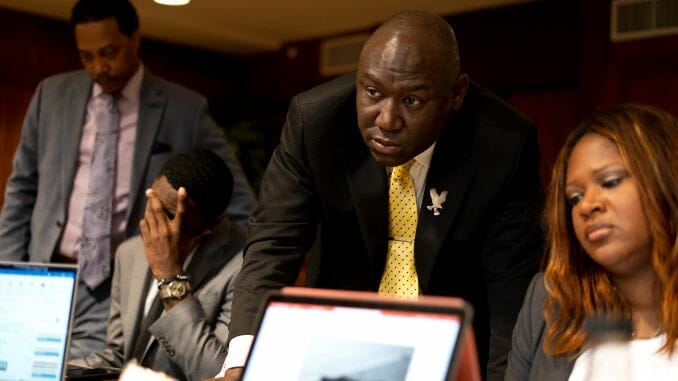Informative Civil Rights Doc Civil: Ben Crump Reminds Us of the Movement’s Limits

Civil: Ben Crump, a documentary directed by Nadia Hallgren, focuses on a year in the life of civil rights attorney Benjamin Crump. It follows several of his cases from 2020 to 2021, especially focusing on the civil litigation against the City of Minneapolis after the murder of George Floyd, and is in part biographical, tracking Crump’s journey from the projects in North Carolina through law school. Civil goes a long way to demonstrate both the breadth of his legal practice—the big names are people killed by police on camera, but he also deals with things like bank discrimination and the intersection of environmental and labor injustice—and the limits to justice that can be found in civil litigation. In attempting to explain Crump’s trajectory and his position in the Black liberation movement, Civil confronts tension between shining light on his work and general aggrandizement. While informative and worth watching, it’s much more of a self-authored back-pat than a critical exploration of a career or the justice system at large. Still, it’s a powerful reminder of the failures of American policing specifically and society in general, one that offers no easy answers and only temporary victories.
The Floyd wrongful death lawsuit is Civil’s main throughline, around which other civil suits for discrimination and wrongful death are organized. “I want to make it financially unsustainable for [police] to continue to kill Black people unjustly,” Crump says.
No less than ten other cases are documented around the country. We meet the loved ones of Breonna Taylor (killed in her apartment while police were serving a no-knock warrant at the wrong address), Angelo Crooms and Sincere Pierce (16 and 18 when they were killed by police), Tafara Williams (shot by police while her boyfriend Marcellis Stinnette was killed; their 7-month-old was in the car with them), Fred Cox Jr. (killed by a sheriff while they were both attending a funeral) and Andre Hill (killed by police leaving his friend’s house). We meet families poisoned from working with Monsanto chemicals on their farms or from the Gopher Battery Plant. On the way to these cases, Crump talks about how he was inspired by people like his grandmother (the matriarch of a family familiar with the wrong side of the justice system) and Thurgood Marshall (who told aspiring Black lawyers “not to argue what is legal, but to argue what is right”), how he and his law partner began as “rent lawyers” doing anything that would pay the rent, and using personal injury and wrongful death work to fund civil rights litigation.
The environmental racism cases are especially meaningful. It’s not as easy to understand as police killing unarmed people, but hiring an entirely Black, mostly formerly incarcerated workforce at $11.63/hour to handle dangerous chemicals, sending them home covered in lead dust and having their kids end up with elevated lead levels in their blood is downright malicious. These, discrimination in farm chemical training and bank discrimination cases are not glamorous or violently morbid, but they represent the everyday enforcement of an apartheid system.
Crump’s partners think he’s done enough civil rights cases; other work is more lucrative, and they’re concerned about his safety (he deals with death threats and conservative media lambasting), mental health and relationship with his family (rendered physically distant by travel, but still loving). Crump doesn’t sleep much. He’s on the road a lot, and this is certainly tiring work. While Civil doesn’t show much in-court footage aside from the mock trial for Breonna Taylor’s case, it focuses on the grief of the families. You can feel it. Ben Crump feels a responsibility to help families get restitution from the governments, banks and other corporations that discriminate against and hurt Black people. But he’s no revolutionary. He’s a trial lawyer.
-

-

-

-

-

-

-

-

-

-

-

-

-

-

-

-

-

-

-

-

-

-

-

-

-

-

-

-

-

-

-

-

-

-

-

-

-

-

-

-








































